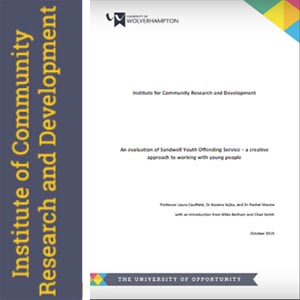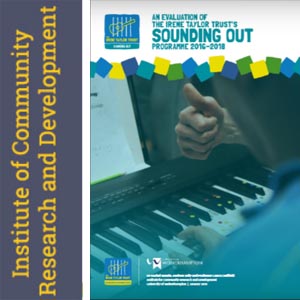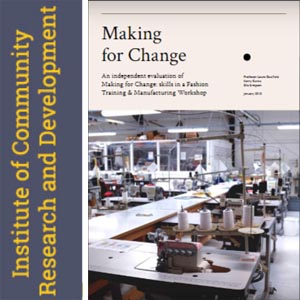
Criminal Justice and Violence Reduction
Criminal Justice and violence reduction are at the forefront of ICRD’s work. We work across the West Midlands region and nationally, helping organisations to understand and improve the impact they have on harm and crime reduction. Our research and evaluation has significant impact on practice in criminal justice and violence reduction across the region. Our work influences commissioning decisions and develops robust methodologies for understanding the impact of programmes in prevention and justice.
ICRD research staff associated with this theme:
- Professor Elaine Arnull
- Sophie Badger
- Professor Laura Caulfield
- Isha Chopra
- Dr Kyros Hadjisergis
- Dr John McDaniel
Current projects
ICRD has been appointed as the lead evaluator of the West Midlands Violence Reduction Unit. The West Midlands Violence Reduction Unit (VRU) was launched in November 2019 as an alliance of organisations in the West Midlands that share the priority of ‘reducing violence’. Led by the WM Police and Crime Commissioner, the VRU was launched with an initial £4m funding from the Home Office.
The evaluation is being delivered in partnership with the Birmingham Voluntary Service Council and the University of Birmingham. Professor Laura Caulfield is leading the work. The evaluation will: allow the VRU to understand the impact of their work on addressing the causes of violence across the region; help the VRU continue to continue to develop their approach through evidence-based commissioning and practice; and will provide new understanding and knowledge that can be shared nationally and internationally. The partnership between the University of Wolverhampton, Birmingham Voluntary Service Council, and the University of Birmingham brings together unique and impressive expertise in large-scale programme evaluation, violence reduction, and community research.
With reports indicating a rise in knife crime related incidents, understanding how young people and their families perceive knife violence is a crucial step in prevention initiatives. With funding from the Active Citizens Fund, One Walsall worked with Kids in Communication and Walsall Metropolitan Council to design and distribute a survey which was completed by 2371 students from 20 schools and 806 parents. Dr Rachel Hopley (ICRD Research Fellow) and Dr Nicole Adams-Quackenbush (Lecturer in Forensic and Legal Psychology) have analysed the responses to the survey exploring perceptions, attitudes and concerns of young people and their parents towards knife crime in Walsall. The report contains demographic details of who responded to the survey together with analysis of the data. Key areas of interest in the findings include how perceptions of safety, perceptions of knife crime, and adverse experiences involving knife related incidents compare with reality and whether perceptions change by age.
Sandwell Youth Offending Service (YOS) work with young people who have very complex life stories. The young people may have committed very serious offences but are also often highly vulnerable to exploitation and have experienced significant trauma. Their experiences can lead to mistrust or suspicion of those in authority and in turn, for practitioners, the challenge of engagement can seem insurmountable. Sandwell YOS therefore argue that an evolution of the current approach is required to more effectively engage, support, and help young people. The new National Standards for youth justice, underpinned by the Youth Justice Board’s (YJB) helpful focus on a ‘child first’ principle support a change in thinking and encourage YOSs to take local initiatives. Sandwell YOS’ vision is to focus on the use of the arts and increasingly reconceptualise the YOS over time into a ‘Creative YOS’.
In January 2019, Sandwell YOS were awarded funding from the YJB’s Serious Youth Violence Grant to help increase the use of arts with the cohort. The ICRD were commissioned to conduct a process and impact evaluation, combining quantitative data to understand if any change was happening with in-depth qualitative interviews to understand how this change might be happening, foregrounding the voice and experience of participants. The new creative programme of work being introduced by Sandwell YOS is innovative in working across the whole service with a range of arts and creative activities, and therefore no similar evaluation has previously been conducted.
The ICRD’s report from the first phase of the evaluation can be found here.
Many prisoners are currently in overcrowded prisons and are poorly served by the cell furniture they live with. This limits their ability to live well, directly and indirectly increasing suffering. The Cell Furniture project aims to generate a new range of cell furniture that is not only robust and sustainable, but endeavours through improved design to increase wellbeing for prisoners and prison staff, and to reduce both the impact of overcrowding, and opportunities for violence, self-harm and suicide. The project hopes to improve furniture currently in use and generate new concepts and develop new designs that could be manufactured inside prison, while considering use, mis-use and abuse - addressing the issues of suicide, self-harm and resistance to vandalism (mis-use and abuse), as well as giving consideration to issues of comfort, aesthetics, safety, security, mass production, maintenance and repair (use).
The project is being led by the Design Against Crime research centre at Central Saint Martins, and is funded by the Ministry of Justice. ICRD are evaluating the Cell Furniture project to understand the process and impact of taking part in a collaborative design approach, for both prisoners and prison staff. This will provide evidence about the successes and challenges of embarking on such an approach within the prison system.
Sounding Out is a project for ex-prisoners designed to support them post-release, through a combination of music production, live performances, and paid training placements. Sounding Out focused on creating new music as a band, showcasing their performers centre-stage at high profile gigs. Sounding Out is run by the Irene Taylor Trust who want to enrich the lives of prisoners at every stage of their journey through the criminal justice system and back into the community.
In a bid to examine the impact Sounding Out has had on its participants, the Institute for Community Research and Development evaluated the programme throughout 2018. The full report can be found here.
Birmingham Youth Offending Service’s music programme is a programme for young people to get involved in making, editing and performing their own music. Participants attend sessions at a professional music studio, with highly trained and experienced staff. The project exists to develop the creative, expressive & musical ability of the young people, improve their skills and confidence, and increase their compliance with their sentence.
Dr Yasmin Devi-McGleish, Andy Jolly, and Professor Laura Caulfield are working on this project.
Making for Change Fashion Training and Manufacturing Workshop is a partnership between HM Prison Service and London College of Fashion. Making for Change takes an innovative approach in prison, linked to improving the engagement of women in prison industries by providing training in fashion production skills and accrediting participants with industry-recognised qualifications.
The evaluation was led by Professor Laura Caulfield, with Kerry Curtis and Ella Simpson at Bath Spa University. Data was collected to assess both if and how the project had an impact, and also to identify any barriers to success. The research team gathered observational, focus group, and interview data with Making for Change participants, staff, and stakeholders at HMP Downview.
The full report can be found here.
In 2018, Public Art Producer Artichoke invited women and girls to come together to celebrate the centenary of the Representation of the People Act, which gave the first British women the right to vote. Over one hundred women artists had been commissioned to produce banners which formed part of the artwork. Historically, Holloway Prison was always associated with the suffrage movement, with many of the final residents of Holloway now occupying HMP Downview. For London College of Fashion and artist Lucy Orta, it only made sense for HMP Downview to also contribute to the procession’s project as part of its unified voice, as they collaborated to produce a banner for the Processions project.
The ICRD’s Director Professor Laura Caulfield worked as a consultant for London College of Fashion, helping to support their involvement and evaluation of the processions programme.


/prod01/wlvacuk/media/departments/media-and-communications/images-18-19/220325-Engineers_teach_thumbail.jpg)
/prod01/wlvacuk/media/departments/media-and-communications/images-18-19/BBR_logo_large.jpg)
/prod01/wlvacuk/media/departments/media-and-communications/images-18-19/Wolves-Story-Thumb.jpg)
/prod01/wlvacuk/media/departments/media-and-communications/images-18-19/220505-BAS9-School-Showcase-Resized.jpg)
/prod01/wlvacuk/media/departments/business-solutions/images/banners/business-we-back-you-500x250.jpg)

